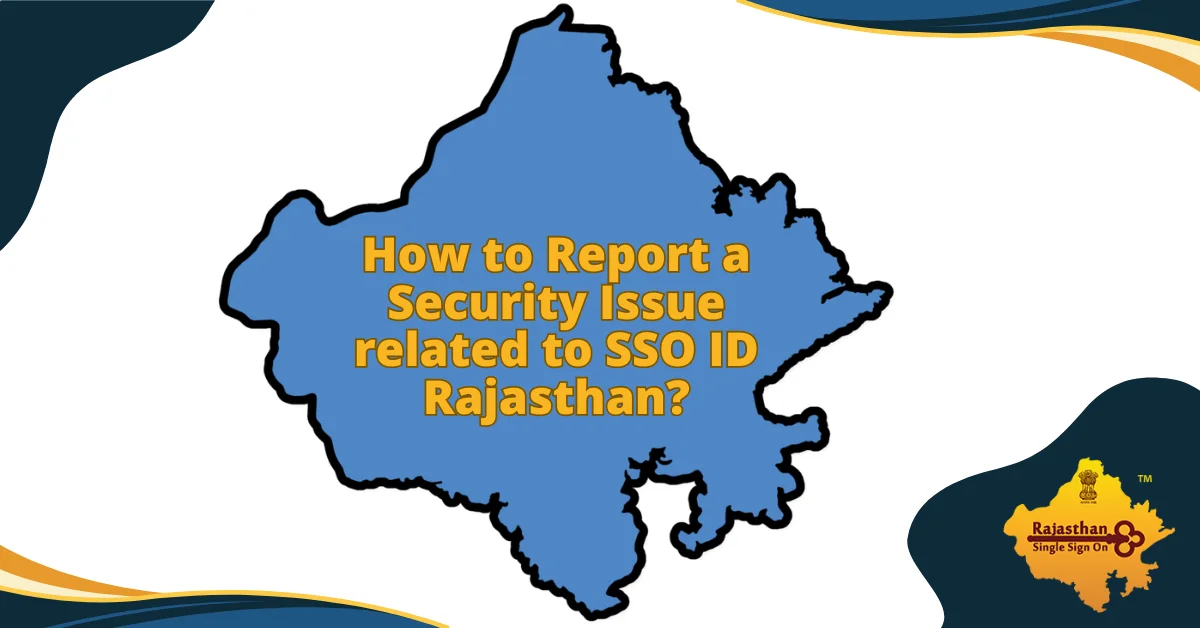As a tech-savvy citizen of Rajasthan, I recently stumbled upon a potential security flaw in our state’s Single Sign-On (SSO) system. The discovery left me both concerned and determined to take action. In 2024, our digital identities are more interconnected than ever, and a vulnerability in the SSO could have far-reaching consequences.
I knew I had to report it, but the path wasn’t immediately clear. Here’s what I learned about reporting security issues related to SSO ID Rajasthan, and how you can do your part to keep our digital ecosystem safe.
Contents
Understanding the Importance of Reporting
Before diving into the reporting process, it’s crucial to understand why reporting security issues is so vital:
- Protect Personal Data: SSO systems hold sensitive information about thousands of citizens. A security flaw could expose this data to malicious actors.
- Prevent System Exploitation: Unaddressed vulnerabilities might be exploited for fraudulent activities or unauthorized access to government services.
- Improve Overall Security: By reporting issues, you contribute to the continuous improvement of the system’s security measures.
- Fulfill Civic Duty: As digital citizens, we share responsibility for the security of our online public infrastructure.
Identifying the Correct Reporting Channels
In 2024, Rajasthan has streamlined its process for reporting SSO-related security issues. Here are the primary channels you should consider:
Rajasthan SSO Helpdesk
- Primary Contact Point: The helpdesk is your first line of communication for SSO-related concerns.
- How to Reach:
- Visit the official SSO Rajasthan portal: [sso.rajasthan.gov.in]
- Look for the “Contact Us” or “Support” section
- Note down the provided phone numbers and email addresses
- What to Expect: The helpdesk can address general issues and escalate serious security concerns to the appropriate team.
Department of Information Technology & Communication (DOIT&C)
- Overseeing Authority: DOIT&C is responsible for implementing and maintaining the SSO system.
- How to Contact:
- Visit the official Rajasthan government website: [https://rajasthan.gov.in/]
- Navigate to the DOIT&C section
- Look for “Security Vulnerability Reporting” or similar options
- Specialized Team: DOIT&C likely has a dedicated cybersecurity team to handle such reports.
Preparing Your Security Report
To ensure your report is taken seriously and acted upon quickly, include the following information:
- Clear Subject Line: Use “Security Vulnerability Report – SSO ID Rajasthan” in your email subject or form title.
- Detailed Description:
- Explain the nature of the vulnerability you’ve discovered
- Describe potential impacts or risks associated with the flaw
- Mention when and how you discovered the issue
- Steps to Reproduce:
- Provide a clear, step-by-step guide to replicate the issue
- Include screenshots or screen recordings if possible (ensure no personal data is visible)
- Mention any specific conditions required to trigger the vulnerability
- Impact Assessment:
- Explain potential consequences if the vulnerability were exploited
- Discuss which user groups or services might be affected
- Estimate the severity of the issue (e.g., low, medium, high, critical)
- Technical Details:
- Specify the browser, operating system, or device used when discovering the issue
- Include any relevant error messages or logs
- Mention if you’ve tested the vulnerability on different platforms
- Suggested Fix (if applicable):
- If you have expertise in the area, propose potential solutions
- Clarify that this is a suggestion and defer to the security team’s judgment
- Your Contact Information:
- Provide your name, email address, and phone number
- Mention your professional background if relevant to the report
- Express your willingness to provide additional information if needed
- Confidentiality Statement:
- Clarify that you’re reporting the issue responsibly and haven’t disclosed it publicly
- Request an update on the resolution process, if possible
Best Practices for Responsible Reporting
When reporting security issues, follow these guidelines:
- Don’t Exploit the Vulnerability: Limit your testing to confirm the issue exists. Avoid accessing or modifying others’ data.
- Maintain Confidentiality: Don’t share details of the vulnerability publicly or with unauthorized parties.
- Be Patient: Give the authorities time to investigate and respond to your report.
- Follow Up Responsibly: If you don’t receive a response within a reasonable timeframe (e.g., two weeks), follow up politely.
- Offer Cooperation: Express your willingness to assist in resolving the issue if needed.
What to Expect After Reporting?
After submitting your report:
- Acknowledgment: You should receive an initial response acknowledging your report within 1-3 business days.
- Investigation: The security team will investigate the reported issue. This may take several days to weeks, depending on complexity.
- Updates: You may receive progress updates, especially for critical vulnerabilities.
- Resolution: Once resolved, you should be notified of the outcome and any actions taken.
- Potential Recognition: Some government departments offer recognition or bug bounty programs for responsible disclosure.
Conclusion
Reporting security issues related to SSO ID Rajasthan is a crucial step in maintaining the integrity of our digital infrastructure. By following these guidelines and using the appropriate channels, you play an active role in safeguarding the personal data of millions of Rajasthan citizens. Remember, in the interconnected digital landscape of 2024, your vigilance and responsible reporting can make a significant difference in protecting our collective online security.

I am Ravi Kumar, a strong believer in citizen empowerment and the transformative power of technology in government. My passion for simplifying public services through technology led me to work on the Rajasthan SSO ID initiative.

